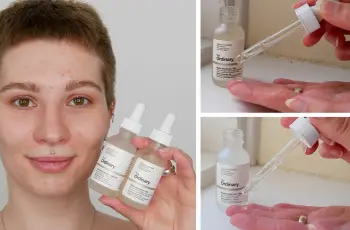
10 Tips to Repair Your Skin’s Cuticle Straight from a Dermatologist
If your goal is a smooth, radiant complexion, having flaky skin on your face isn’t going to make things any easier—just ask any foundation with experience tackling dry patches. Between over-exfoliating and using the wrong cleanser for your skin type, there are a few factors that could be exacerbating dry skin on your face. But that doesn’t mean you can’t tweak your skincare routine, including some of our favorite cleansers, to pave the way for the ultra-hydrated complexion you’ve always dreamed of.
We know that battling dry skin can often seem like a losing battle. That’s why we asked celebrity aestheticians Renée Rouleau and Shani Darden, and board-certified dermatologist and Epionce founder Carl Thornfeldt, to find out what causes extremely dry skin and how we can get rid of it once and for all. 01. Determine if you’re dehydrated or just dry
In fact, you might be confusing dry skin with dehydrated skin. The difference? Dry skin refers to a skin type (just like oily or combination skin), while dehydrated skin refers to a skin condition, Rouleau says. Rouleau says dryer
Skin lacking oil can be hereditary, so it can appear flaky and rough. 1 Dehydrated skin, on the other hand, lacks moisture and appears dull and tight.
According to Rouleau, truly dry skin produces neither oil nor sebum. Dry skin has tiny pores and will never break out, Rouleau claims, because there’s no oil to enlarge follicles or harbor bacteria. Flawless skin and
Small pores may not sound so bad, but the skin relies on oil to retain moisture. Without oil, your complexion may appear rough and flaky, and wrinkles may become more noticeable.
Bottom line: If you have oil-free skin (i.e., small pores and little to no acne), you may have dry skin. Also, if you notice scaling and irritation, you may feel more confident in your diagnosis. If
You may have dehydrated skin if your skin is tight or dull, or if you’ve been drinking all night (which can dehydrate your skin, not to mention rosacea and acne 2).
02. Avoid over-exfoliation
Maybe you use a cleansing brush twice a day (too much!) or use too many retinol and acid serums. Whatever the case, even if you think these habits are improving your skin’s appearance, they can actually weaken your skin’s moisture barrier
damage your skin and cause surface dryness and irritation. 3 “Any form of exfoliation compromises the skin’s protective barrier and triggers an inflammatory response in the skin,” says Thornfeldt. “While acute inflammation stimulates collagen and elastin synthesis, chronic inflammation and barrier damage are linked to many skin issues and conditions—especially when the skin is already dry and the skin barrier is more damaged, over-exfoliation can make the problem worse.” But don’t let that stop you from exfoliating. According to Darden, it’s still important to exfoliate dry and sensitive skin because your moisturizers and treatments can’t be properly absorbed without removing dead skin cells on the surface. If you have extremely dry skin, Thornfeldt recommends reserving physical peels for a professional setting (such as microdermabrasion) and using low-concentration chemical peels (also known as acids) that won’t trigger a harmful reaction. Try these exfoliating pads from Kinship, which are made with glycolic acid (AHA) as well as the brand’s plant-based probiotics to help maintain your moisture barrier. 03. Use sulfate-free cleansers
Foaming and gel cleansers may look fancy, but Ruleau says many of them contain sulfates (you’ll notice them on the ingredient list as sodium lauryl sulfate, sodium laureth sulfate, or ammonium laureth sulfate).
“This ingredient is a surfactant, a cleanser that strips oils from your skin,” Ruleau says. “These ingredients are very harsh and strip your skin of moisture every time you wash it.”
Thornfield agrees, adding that when there’s too much oil on your skin, the skin’s protective barrier breaks down. “There are important oils in your skin that act like glue to hold the skin barrier together,” he explains. “If
If these oils are damaged or removed, the skin barrier is more vulnerable to breakdown and harmful environmental effects like UV radiation or pollution can penetrate. While this applies to all skin types, it presents a greater challenge.
For dry skin types.
Choosing a cleanser is the most important step in your skincare routine, Rouleau says, because washing with a dry cleanser strips your skin of moisture, which means you need to rush out and apply a moisturizer to replace the absorbed moisture. We like this one from Pacifica because it’s not only sulfate-free, but it also contains hydrating hyaluronic acid for super-plump skin. 4
04. Take care of your skin quickly
Rouleau recommends using a toner and moisturizer with an alcohol-free formula, like this one from Epionce, immediately after washing your face. “If you leave your skin bare for more than a minute, it will start to dry out,” she says. “Start your skincare routine quickly to make sure your skin is always hydrated. ”Since using a toner or moisturizer right after washing your face can help lock in some moisture, you may not need to use a lot of product. 05. Use a night cream to repair dryness Some people avoid using night cream to let their skin “breathe,” but both Rouleau and Thornfeldt agree that it’s important to use a moisturizer at night. Thornfeldt says that night creams work best when the skin is in repair mode at night. During the day, our skin is in protection mode, fending off daytime disturbances like UV rays and pollution. 6 “At night, when your skin is at rest, its permeability is at its highest, allowing active ingredients to penetrate deep into the skin,” says Rouleau. Then you can really address your skin care concern (in this case, dryness) because your skin is no longer acting as a defense.
A night cream is essentially a moisturizer without the sunscreen, and you don’t necessarily have to use anything specifically labeled “night cream.” Any moisturizer without SPF will work as long as it’s appropriate for your skin type.
Ranavat’s selection has a luxuriously rich consistency that’s perfect for dry skin and is enriched with anti-aging botanicals like poppy seed and lotus.
06. Add moisture to the air with a humidifier
In addition to lotions, potions, and creams, the solution to dry skin is as simple as plugging in a humidifier. Especially in the winter (or in a dry climate year-round), adding humidity is important because it will help keep your skin hydrated. 7 Darden recommends this Dyson humidifier because it helps keep the air clean and in tip-top condition. The perfect moisture level keeps your skin more hydrated and comfortable overnight and throughout the day.
07. Use hydrating essential oils
Thornfeldt explains that a healthy skin barrier is made up of a mixture of cholesterol, ceramides, and free fatty acids. The true effectiveness of a product for dry skin depends on whether it helps restore the skin barrier. To do this, it must contain oils, especially the oils found in healthy skin. 8 If you’re worried about clogged pores, Thornfeldt says the product won’t clog pores if the oils are pure and free of impurities. “Remember that hydration refers to the ability to retain water. However, since dry skin can’t produce enough oil, adding more water without the oils the skin barrier needs is counterproductive and doesn’t meet the needs of dry skin,” he says.
08. Wear sunscreen frequently
Dry skin also compromises your moisture barrier, which isn’t a good thing. This means that tiny cracks can form in the layers of skin that are designed to retain moisture and irritants. 9 These cracks can cause skin to burn and look flaky, says Rouleau. If the damage isn’t repaired, it will eventually lead to a breakdown of precious collagen and elastin, the substances that keep us looking young.
The way to combat fine lines and wrinkles? Protect your skin from the sun—rain or shine. “Applying sunscreen every day is the most important thing you can do to keep your skin healthy and glowing,” says Darden. “Even if you’re indoors all day, UV rays can penetrate through windows, so it’s important to protect your skin.” She recommends using a hydrating sunscreen that doubles as a daily moisturizer to keep your routine simple but effective.
The key is to find a product you love so much that you want to wear it every day, rather than using an SPF just for its protective properties. We’re fans of this cream from J.Lo Beauty because it’s both hydrating and packed with SPF.
09. Shower with warm water
As hard as it is to resist a hot shower, especially in the winter, shower with warm water. Hot water strips your skin of moisture and can damage your skin barrier – If you have dry skin, avoid hot water. But hot water doesn’t just damage your skin. Your hair, too. A hot shower can strip your hair of moisture, too. It might be hard to turn down the temperature at first, but a hot shower has benefits
Your entire body and skin will thank you.
10. Try home remedies
Yes, serums, moisturizers, and dry skin products are your best bet for sagging skin, but don’t underestimate the power of home remedies. Make your own avocado mask, take a milk bath, or donate
Moisturize your skin with plant butters. Like shea butter and jojoba oil, you can use these products in your stash to soothe dry skin.


